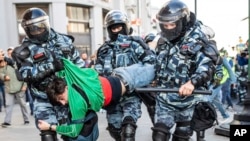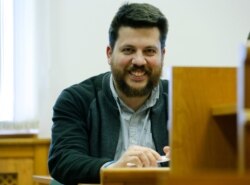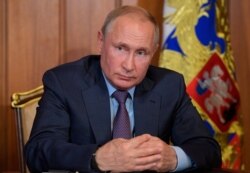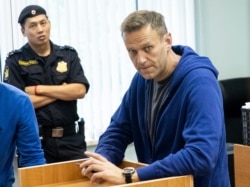This story originated in VOA's Russian Service.
WASHINGTON - VOA Russian Service's Danila Galperovich caught up with Leonid Volkov, fundraising chief for prominent Russian opposition figure Alexei Navalny, to discuss the recent street protests and mass arrests in Moscow.
The interview occurred just hours after Russian officials took the unprecedented step of freezing all financial assets associated with Navalny's anti-corruption watchdog, Foundation for Fighting Corruption (FBK), which was founded to spotlight the excessively lavish lifestyles of top government and Kremlin officials.
Volkov is among the most prominent opposition figures in Moscow, and one of the only ones left to offer insights about prevailing turmoil on the ground in Russia, where his boss, Navalny, along with other opposition figures, have been jailed.
Danila Galperovich: The sudden court-ordered freeze of FBK finances and searches of your offices and staff domiciles are especially harsh actions. To what degree did you anticipate this?
Leonid Volkov: This is a completely predictable thing, and I had expected it. Our network of offices [created as part of Navalny's attempt to participate in the presidential election in Russia in 2018] is very annoying to them, and FBK is annoying them, and it was very expected that they would try to break it all down.
How? Despite the fact that we work as idealists there are nonetheless people, offices within the organization. I have approximately 150 employees throughout the entire structure, and so there are contracts, salaries, taxes, rental payments, etc... And any organization that employs 150 people—whether we're conducting anti-corruption investigations or packaging yogurt—cannot work without active financial accounts, without contracts, without a legal entity and so on.
We've long known that a documented organization is necessary risk, an inevitably vulnerable weak spot, and so we expected they would take a blow at it. We even prepared for it. Some of our preparations worked, so they weren't able to break it all.
But why did they choose to hit us now? I think that, previously, it hadn't been sanctioned by the first person [a reference to President Vladimir Putin], but then the court orders and searches were ultimately sanctioned by him under the guise of "mass riots."
That is, some security officials came and sold Putin one the idea: "Listen, you've been soft with these activists, but these people are doing Maidan here. Let's scare them already." And they went ahead a deployed these court orders and search warrants that, apparently, they'd been sitting on since 2016.
DG: The Russian authorities decided to accuse the FBK of precisely what the Fund itself very often accuses Russian officials: of trying to launder money obtained illegally. Why do you think?
LV: It's actually very funny. It has already been noted that when someone needs to be accused of murder, the call always comes from MP Lugovoi, who is actually accused of murder in Britain. Everything is done according to this logic.
For example, allegations we've "laundered a billion rubles" are being levied by the very officials whose homes we've proven are worth literally millions of dollars. Thieves make accusations of theft; murderers make accusations of murder; rapists make accusations of violence and rape. In psychology, I believe this is what's called projection.
DG: How much does the FBK crackdown correspond to the general trend of increasing repression? We have already seen ostentatious cruelty during the dispersal of rallies, bringing criminal charges and mass searches.
LV: The authorities, of course, have decided to escalate repression in response to the rallies for free and fair elections, with which FBK works hand-in-glove.
Just as the intensity of protests has increased, so has the response. Whereas once we saw demonstrators merely dispersed, we now seem them viciously beaten back with batons. Whereas only some had been restricted from running in elections, now no one is allowed.
It's the same with the legal bureaucracy: where once we they fought us with administrative cases, now they fight us with criminal cases. But there's not much to be especially worried about.
Judging by the reaction of colleagues with whom I have been in touch all day today, everyone was already mentally prepared. This situation has been unfolding gradually before our eyes for many years, so everyone is mentally prepared. No one is whimpering. Everyone is strong.
DG: There is an opinion that now the situation with the crackdown on the protest is controlled not so much by Putin as by security officials around him, that the special services began to dominate in determining the actions of the authorities in relation to the protesters. How much do you agree with this?
LV: Putin would not have been in power for 20 years if he hadn't been talented enough in the art of maintaining political balance: here on the one hand he has siloviki [security forces, strongmen], and on the other hand are liberals; thieves here, patriots there; Orthodox here, entrepreneurs there.
In general, he knows how to play this thing—how to prevent the reinforcement of some clans over others around him, so as not to become hostage to any one of them. Therefore, Putin has always played the role of a kind of inertial ballast: as soon as one party accelerates too much, he always holds it back.
But here, in this story, we see that something skewed: people like [Russian Security Council Secretary Nikolai] Patrushev or [Russian FSB chief Aleksandr] Bortnikov, they got paranoid; they're both anti-Semites who support conspiracy theories, which is to say they really believe that the CIA gives millions in bitcoins to hasten Russia's collapse.
I don't think Putin believes that, but even if he did, I don't think that he would want Patrushev and Bortnikov to steer the country and determine the agenda.
He holds his place, thanks to the balance between Patrushev and [Prime Minister Dmitry] Medvedev, [Putin confidante and Rosneft chief Igor] Sechin and [Rostec CEO Sergei] Chemezov, and so on. They all need him as an ultimate decision-maker.
And yet, on this wave of protests, apparently, Putin has become really scared. And this pendulum, the balance, swayed toward these crazy old men, real Andropovism—not Stalinism, but Andropovism. This is good in its own way: such a swing of the pendulum, an imbalance in a system of this level is, of course, a step towards its destruction.
DG: And how will all this really affect the events of the coming month or two? The elections themselves to the Moscow City Duma?
LV: I see a victory in "smart voting" [tactics proposed by Alexei Navalny, who called for voting for any popular candidate, except for candidates from United Russia].
It seems to me that now the Muscovites' anger at the police force is such that we are really ready to just go and to defeat "United Russia" completely!
And this will be an important political outcome— that is to say, in the end, there will be no feeling that it was all for nothing. This whole story will probably end with the victory of the forces of good.
DG: But if they can ignore protesters' demands in the streets, aren't they just as likely to falsify ballots at the polls?
LV: Well, in Moscow since 2011, votes were not falsified when counting, because Moscow has a very strong election observers movement. Because of that, past attempts to falsify ballot counts in Moscow resulted in you know what [Volkov is referring to street protests of 2011-2012].
We will prepare very well. In addition to all the operational activities related to these searches, my main task now is to prepare election observations.
DG: How much money has been frozen?
LV: There are 28 million rubles [about $430,000] frozen in FBK accounts. For us it is a lot of money! This is almost half the annual budget. The accounts had accumulated because our last investigations about [Moscow Deputy Mayor Natalia] Sergunina and [Moscow City Duma deputy chairman Andrey] Metelsky became popular and we received record donations. And we have accumulated a really large amount.
The fact that these finances have been frozen is a big problem for us. On the other hand, at some point this freeze will probably be lifted. In other accounts, in total, we probably lost about 3 million rubles [$46,200]. You can live with that.














